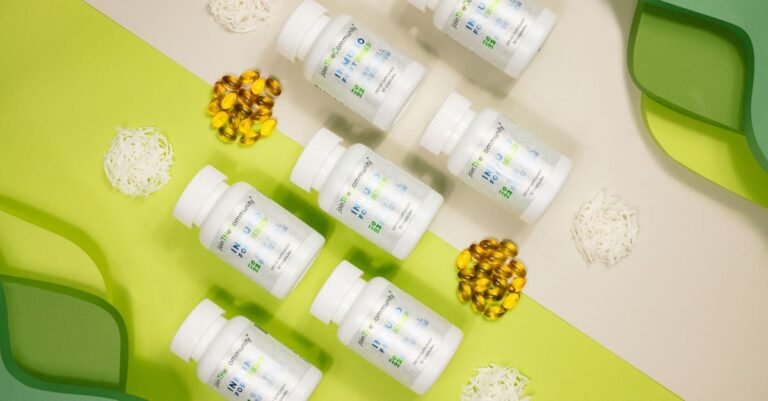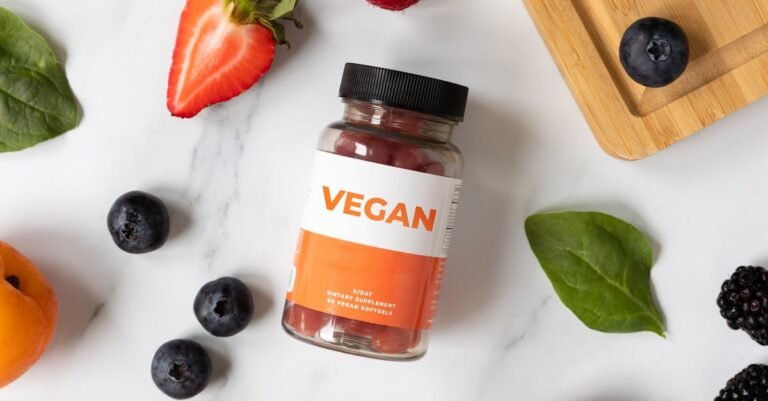Table of Contents
- Top Sea Moss Supplements for Immune Support: Your Ultimate Guide
- What Exactly is Sea Moss Anyway?
- Why is Immune Support So Crucial Today?
- How Does Sea Moss Boost Your Immune System?
- Choosing the Best Sea Moss Supplement: What to Look For
- Top Sea Moss Supplement Picks for Immune Health
- How to Incorporate Sea Moss into Your Daily Routine
- Potential Side Effects and Considerations
- Conclusion: Is Sea Moss Your Immune Ally?
- Frequently Asked Questions (FAQs)
Top Sea Moss Supplements for Immune Support: Your Ultimate Guide
Feeling run down? Constantly battling sniffles or just want to give your body’s natural defenses a serious boost? You’re not alone. In today’s fast-paced world, keeping our immune system in tip-top shape is more important than ever. We’re constantly bombarded with stressors, environmental challenges, and let’s face it, sometimes our diets aren’t perfect. This is where nature often steps in with some incredible solutions, and one that’s been making serious waves lately is sea moss. Ever heard of it? Maybe you’ve seen it popping up in health stores or heard wellness gurus raving about it. But what’s the real deal? Can this ocean dweller actually help bolster your immunity? Let’s dive deep and explore the world of sea moss supplements specifically for immune support.
What Exactly is Sea Moss Anyway?
Okay, first things first. Sea moss isn’t actually moss like the fuzzy green stuff on trees. It’s a type of red algae, scientifically known as Chondrus crispus, though other related species are often used interchangeably. Think of it as a nutrient-packed sea vegetable that grows primarily in the cooler, rocky coastal regions of the Atlantic, particularly around Ireland, Europe, and North America. It comes in various colors, from deep purple and red to greenish-yellow and brown, depending on where it grows and how it’s dried.
A Gift from the Ocean: Understanding Irish Sea Moss
Often called “Irish Moss,” its use dates back centuries. During the Irish Potato Famine in the 1800s, people turned to this resilient seaweed as a source of vital nutrients when food was scarce. It was boiled into broths and jellies, providing much-needed sustenance. This historical use hints at its dense nutritional profile – it wasn’t just filler; it was life-sustaining. It’s this rich history and traditional use that first sparked modern interest in its potential health benefits, especially for bolstering the body’s resilience.
Not Just Seaweed: Key Nutrients Galore
So, what makes this sea vegetable so special? It’s famously touted as containing 92 of the 102 essential minerals our bodies need. While pinpointing the exact number is tricky and can vary based on growing conditions, there’s no doubt sea moss is incredibly nutrient-dense. We’re talking about a rich source of iodine, potassium, calcium, magnesium, zinc, selenium, iron, and various vitamins like Vitamin C, B vitamins, and Vitamin K. It also contains amino acids, antioxidants, and fiber. It’s like a multivitamin straight from the ocean floor! This impressive array of nutrients is the foundation for its purported health benefits, particularly when it comes to supporting our immune function.
Why is Immune Support So Crucial Today?
Before we connect the dots fully to sea moss, let’s quickly touch on *why* everyone’s suddenly so focused on immune health. Think of your immune system as your body’s personal security team, working 24/7 to protect you from invaders like bacteria, viruses, and other harmful pathogens. It’s a complex network of cells, tissues, and organs that needs to be well-maintained to function optimally.
Our Body’s Defense System: A Quick Overview
Your immune system has two main parts: the innate system (your first line of defense, like skin and mucous membranes) and the adaptive system (which learns to recognize specific threats and builds targeted defenses, like antibodies). Both need the right resources – nutrients, rest, low stress – to work effectively. When this system is strong, you might fight off a cold before you even notice symptoms. When it’s weakened, you become more susceptible to getting sick, and recovery can take longer.
Modern Challenges to Immunity
Life in the 21st century throws a lot at our immune systems. Chronic stress, lack of sleep, processed foods, environmental toxins, and even a sedentary lifestyle can all put a strain on our defenses. It’s like asking your security team to work double shifts with faulty equipment and poor rations – eventually, something’s got to give. This is why actively supporting our immune health through diet, lifestyle, and potentially beneficial supplements has become a priority for so many health-conscious individuals.
How Does Sea Moss Boost Your Immune System?
Alright, let’s bring it back to our star player: sea moss. How does this oceanic wonder actually contribute to a stronger immune response? It seems to work on multiple fronts, leveraging its unique nutritional makeup.
The Nutrient Powerhouse Connection
As we mentioned, sea moss is loaded with goodies. Many of these nutrients are directly involved in immune function.
Vitamins and Minerals at Play
Think about key immune players like Vitamin C, known for stimulating the production and function of white blood cells. Zinc is crucial for immune cell development and communication. Selenium acts as a powerful antioxidant, protecting immune cells from damage. Iron is essential for the proliferation and maturation of immune cells. Potassium plays a role in regulating fluid balance, which is indirectly important for immune cell function. Sea moss provides these and many others, offering broad nutritional support that your immune system can draw upon.
Amino Acids and Antioxidants
Beyond vitamins and minerals, sea moss contains various amino acids, the building blocks of proteins, which are essential for creating antibodies and immune cells. It also boasts antioxidants like flavonoids and carotenoids. Antioxidants are vital because immune responses naturally generate oxidative stress (think of it as cellular ‘exhaust’). Antioxidants help neutralize this ‘exhaust,’ protecting your immune cells and allowing them to function more effectively without getting damaged in the process.
Prebiotic Properties: Feeding Your Gut
Did you know a massive portion of your immune system resides in your gut? Seriously, around 70-80%! The trillions of bacteria living there (your gut microbiome) play a critical role in training and regulating your immune responses. Sea moss is rich in dietary fiber and complex carbohydrates (oligosaccharides) that act as prebiotics. Prebiotics are essentially food for your beneficial gut bacteria. By feeding these good guys, sea moss helps promote a healthy gut environment. A balanced gut microbiome is strongly linked to a more robust and balanced immune system, better equipped to handle threats and less likely to overreact (as seen in allergies or autoimmune conditions).
Anti-inflammatory and Antiviral Potential
Chronic inflammation can suppress immune function over time. Some preliminary research and traditional use suggest that compounds in sea moss may possess anti-inflammatory properties. By helping to modulate inflammation, sea moss could potentially support a more balanced immune response. Furthermore, some studies, primarily *in vitro* (in lab dishes, not humans yet), have indicated that certain components of seaweeds like sea moss might have antiviral activity. Compounds like carrageenan (found in sea moss) have been studied for their ability to potentially interfere with virus replication. While more human research is definitely needed, these initial findings are intriguing and add another layer to sea moss’s potential immune-supporting role.
Choosing the Best Sea Moss Supplement: What to Look For
Okay, you’re intrigued. You want to give sea moss a try. But walk into a health store or browse online, and you’ll find a dizzying array of options. Gels, capsules, powders, gummies… wildcrafted, pool-grown… how do you choose? Quality and sourcing are paramount.
Source Matters: Wildcrafted vs. Pool Grown
This is a big one. Wildcrafted sea moss is harvested from its natural ocean habitat. Proponents argue this results in a more nutrient-dense product, as the algae absorbs minerals from the rocks and seawater it grows in. However, wildcrafting needs to be done sustainably to protect ocean ecosystems, and there’s a potential risk of contamination from pollutants or heavy metals depending on the harvest location. Pool-grown (or tank-grown/aquacultured) sea moss is cultivated in controlled environments. This allows for greater control over water quality and potential contaminants, but some believe it may lack the full mineral spectrum of wild-grown varieties. Ideally, look for wildcrafted sea moss harvested from clean, tested waters or reputable pool-grown options that provide transparency about their cultivation methods.
Form Factor: Gels, Capsules, Powders, or Gummies?
The best form really depends on your lifestyle and preferences:
- Gels: This is considered the most traditional way to consume sea moss. Dried sea moss is soaked and blended with water to create a gel. It’s versatile – you can add it to smoothies, drinks, soups, or even use it topically. It requires refrigeration and has a shorter shelf life. Many feel this form is the most potent and easily absorbed.
- Capsules: Convenient for travel and those who dislike the taste or texture of the gel. Dosage is standardized. Ensure the capsules contain pure, ground sea moss without excessive fillers.
- Powders: Similar versatility to gels – easily mixed into liquids or food. It’s shelf-stable and good for those who want to control their dosage precisely. Look for finely ground powder for better mixing.
- Gummies: A tasty and easy way to take sea moss, especially popular with kids or those who struggle with pills. However, check the ingredients carefully! Many gummies contain added sugars, artificial colors, and flavors. Look for options with minimal additives and natural sweeteners.
Purity and Third Party Testing
Because sea moss grows in the ocean (or simulated ocean water), it can potentially absorb heavy metals like arsenic, mercury, or lead if grown in contaminated areas. Reputable brands will conduct third-party lab testing to verify the purity of their product and ensure heavy metal levels are within safe limits. They should also test for microbial contaminants. Look for brands that are transparent about their testing results – sometimes provided via a Certificate of Analysis (CoA) on their website or upon request. Don’t skimp on this step; purity is crucial for safety.
Top Sea Moss Supplement Picks for Immune Health
Instead of listing specific brand names which can quickly become outdated or reflect personal bias, let’s focus on the *characteristics* that define a top-tier sea moss supplement for immune support, regardless of the brand.
Spotlight on High-Quality Gel Supplements
A top-quality sea moss gel will typically be made from wildcrafted sea moss sourced from reputable, clean waters (like St. Lucia or parts of the North Atlantic known for purity). Look for gels made simply with sea moss and filtered or spring water, with maybe a natural preservative like key lime juice. Avoid gels with added sugars, artificial flavors, or unnecessary fillers. The texture should be smooth, and the color should reflect the type of sea moss used (golden, purple, etc.). Transparency about sourcing and preparation methods is key. These often require refrigeration and have expiration dates, indicating freshness.
Convenient Capsule and Powder Options
For capsules and powders, prioritize products that clearly state the type of sea moss used (e.g., Chondrus crispus) and its origin. Look for 100% pure sea moss powder with no fillers, binders, or artificial ingredients. Organic certification is a plus, though not always feasible with wildcrafted sources. Again, third-party testing for heavy metals and contaminants is non-negotiable for a top pick. Check the dosage per capsule or scoop to ensure it aligns with general recommendations (often starting around 500mg-1000mg daily).
Tasty Gummy Alternatives
If you opt for gummies, scrutinize the ingredient list. The best options will use real fruit purees or natural flavors and sweeteners like stevia or monk fruit, rather than high-fructose corn syrup or artificial sugars. They should clearly state the amount of sea moss extract per gummy. Look for added immune-boosting ingredients like Vitamin C, Zinc, or Elderberry, but ensure the sea moss itself is still the star and sourced/tested properly. Avoid gummies packed with artificial colors and preservatives.
How to Incorporate Sea Moss into Your Daily Routine
So you’ve chosen your high-quality supplement. Now what? Integrating sea moss is usually pretty simple:
- Gels: Start with 1-2 tablespoons daily. The easiest way is to blend it into smoothies – it acts as a thickener and is virtually tasteless when mixed with fruits and other ingredients. You can also stir it into juices, teas, soups, stews, oatmeal, or even use it as an egg replacement in some vegan baking recipes!
- Capsules: Follow the dosage instructions on the bottle, usually taken with water.
- Powders: Mix the recommended scoop size (check the label) into water, juice, smoothies, or sprinkle it over food like yogurt or salads.
- Gummies: Take the recommended number of gummies daily, as indicated on the packaging.
Consistency is key! Like any natural supplement, sea moss works best when taken regularly over time as part of a healthy lifestyle.
Potential Side Effects and Considerations
While generally considered safe for most people when consumed in moderation, there are a few things to keep in mind:
- Iodine Content: Sea moss is very rich in iodine. While iodine is essential for thyroid function, *too much* iodine can cause thyroid problems (both hyperthyroidism and hypothyroidism), especially in individuals with pre-existing thyroid conditions like Hashimoto’s thyroiditis. It’s crucial to stick to recommended dosages and be mindful of other iodine sources in your diet. If you have thyroid issues, consult your doctor *before* starting sea moss.
- Heavy Metals: As mentioned, contamination is a potential risk if not sourced carefully. Always choose brands that provide proof of third-party testing for heavy metals.
- Blood Thinning Effect: Sea moss contains compounds (like fucoidans, similar to carrageenan) that can have mild blood-thinning properties. If you are taking blood-thinning medications (like warfarin), talk to your doctor before using sea moss regularly.
- Digestive Upset: Some people might experience mild digestive issues like bloating or changes in bowel movements when first starting sea moss, likely due to the high fiber content. Starting with a smaller dose and gradually increasing it can help.
- Allergies: While rare, allergies to seaweed are possible.
Bottom line: Always start with a low dose, choose high-quality, tested products, and consult with your healthcare provider before adding sea moss (or any new supplement) to your routine, especially if you have underlying health conditions, are pregnant or breastfeeding, or are taking medications.
Conclusion: Is Sea Moss Your Immune Ally?
So, can sea moss supplements genuinely support your immune system? The evidence, rooted in its incredible nutrient density, prebiotic fiber content, and potential anti-inflammatory and antiviral properties, certainly looks promising. By providing a wide array of minerals, vitamins, and other beneficial compounds, sea moss can help fill nutritional gaps and support the complex machinery of your immune defenses. It nourishes your gut microbiome, a cornerstone of immunity, and may help modulate inflammation. However, it’s not a magic bullet. Think of it as a valuable player you can add to your team, but it needs to work alongside other key strategies: a balanced diet, regular exercise, sufficient sleep, and stress management. Choosing a high-quality, properly sourced, and tested supplement is crucial for safety and efficacy. If you’re looking for a natural way to potentially enhance your body’s resilience, sea moss is definitely worth considering, but always approach it mindfully and consult with a health professional to ensure it’s the right fit for you.
Frequently Asked Questions (FAQs)
1. How much sea moss should I take daily for immune support?
There’s no official recommended daily allowance (RDA) for sea moss. Common dosages range from 1-2 tablespoons of gel (around 4-8 grams) or 500-1000mg in capsule or powder form per day. It’s best to start low, see how your body responds, and follow the specific product’s instructions. Due to the high iodine content, it’s crucial not to exceed recommended amounts without professional guidance.
2. How long does it take to notice benefits from taking sea moss?
This varies greatly from person to person depending on their individual health status, diet, lifestyle, and the consistency of use. Some people report feeling increased energy or improved digestion within a few days or weeks, while immune benefits might be more subtle and noticeable over longer periods (e.g., potentially experiencing fewer colds or recovering faster over several months). Consistency is key.
3. Can I take sea moss if I have a thyroid condition?
You absolutely MUST consult your doctor before taking sea moss if you have any thyroid condition (hypothyroidism, hyperthyroidism, Hashimoto’s, Graves’ disease, nodules, etc.). Sea moss is very rich in iodine, which can significantly impact thyroid function and potentially worsen existing conditions or interfere with medications. Don’t self-prescribe; get medical advice first.
4. Is wildcrafted sea moss always better than pool-grown?
Not necessarily. While wildcrafted sea moss may potentially offer a broader range of minerals absorbed from its natural environment, it also carries a higher risk of contamination (heavy metals, pollutants) if not harvested from pristine waters. Pool-grown sea moss offers better control over purity but might have a slightly different nutritional profile. The “better” option depends on the specific source: prioritize transparency, sustainable harvesting (if wildcrafted), and rigorous third-party testing for purity, regardless of the growing method.
5. Can kids take sea moss for immune support?
It’s best to consult a pediatrician before giving sea moss supplements to children. While some parents do incorporate small amounts (often in gummy form or blended into food), dosage needs to be carefully considered based on age and weight, especially concerning the iodine content. A healthcare professional can advise if it’s appropriate and suggest a safe starting dose.










